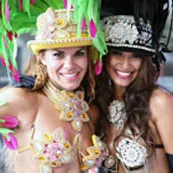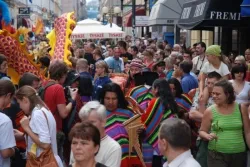(Continuation from “Living the Peruvian Experience: The Beginning,” in All Peruvians play folk near Metro Centrum!)
Peru is Diversity
Peru is Diversity, Peru means Diversity. Probably, this is one of the few times we are so sure about something that we dare to put it in such a straight way. But, indeed, Peru is so diverse by all means that even it is diverse in a negative way. With that we mean that, just like anything around us, everything has advantages and disadvantages, and it is undeniable that Peru’s biggest problems are related to issues of national identity and racism. Finding a common identity for Peru is probably one of the most difficult things to ask a Peruvian fellow. Most people are blind to the existing social conflict between groups unconsciously divided. This division occurs when the natural and constructed identities of the Peruvians are so complex and are themselves already a compendium of identities that the individuals find it hard to define themselves in front of others living under the same flag. The Peruvian Nobel Prize laureate, Mario Vargas, optimistically pointed at that matter when saying that Peru does not have an identity because it has all of them. And from this statement we start drawing a conclusion for our central title All Peruvians play folk near Metro Centrum!
Yes, folk and panpipes, or more precisely, Andean folk music and panpipes, are what the most ordinary person in the world will come across by spending less than 10 seconds in a place like Metro Centrum, in the very heart of Warsaw. One does not need the Internet to find Peru’s map, or a tourist guide to learn about the most important sites to visit, or a chat with a Peruvian to learn about Peru’s History or cultural diversity, or attending a well-balanced photo exhibition to see what animals are found in the Pacific coast, the Andean mountains and the Amazon rainforest. One only needs to walk and listen to the music: no choice. Music is a form of communication that carries a melody designed to enchant and sometimes to sell by enchanting. We cannot fight against the stereotypes that may be form in the heads of millions of Polish people, Europeans, and everyone on this planet, who are exposed in the daily basis to this music. And just like we said about Machu Picchu, about the Incas, and about the friendly llamas: it is not them that are wrong, it is us who are choosing to avoid so much greatness this world has to offer. If everything must have a balance, why do we take everything as it comes and not exploit the diversity it is part of?
The Andean folk music and the panpipes are what the world knows about Peru because it was in the hand of those people who play them to choose not to cross the borders just to work in any way it gives them money but in a way they enjoy…even love. In places like Metro Centrum is where they built a career for themselves and a career for their children, while spreading their culture, a culture that pitifully in the Peruvian context has been discriminated against during the last five centuries. Now, it is time for us, the Peruvians who represent other identities, to share also our cultures with the world, to celebrate them intensely. At the same time, it is time for Polish people and others to get ready to understand that what they know about Peru so far is a reflection of the Andean mountains, which is only one part of a great compendium of diversity that Peru has to offer, that there are Peruvians living in urban areas looking just like any European city in the same way any Warsaw boy or girl lives; where they are looking forward to the next weekend to enjoy just like anyone else in the world would; and where they are concerned about building modern, intelligent, competitive, unique and democratic first-class societies they could be proud of, in the same way Polish youngsters are doing. In conclusion, Peru owes great respect to its Machu Picchu, to its Incas, to its llamas, to its Andean folk musicians and to the melody of its panpipes, however, there is much more than that, and it is in the hands of Peruvians to show it and in the hands of Polish people to openly discover it. Only in this way, we will manage to put the next pebble on the road to tolerance and understanding.
Luis Escobedo













